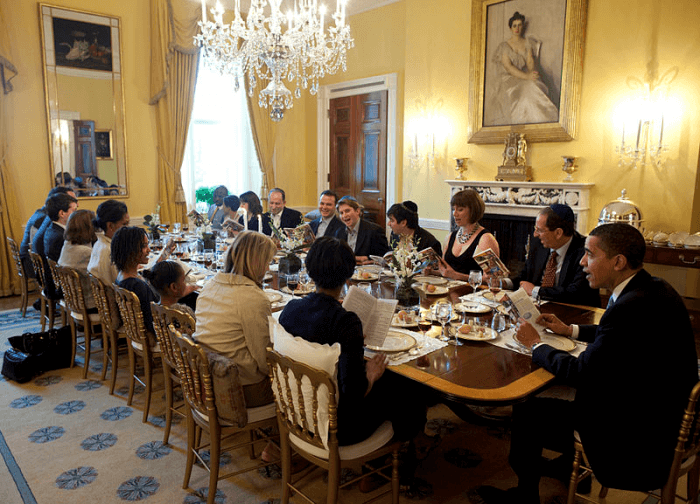
Let’s talk about the Passover Seder, shall we? It’s the Jewish holiday that gets the most buzz from Christians, it seems like. Since the Passover season is fast approaching and this is one of the most important holidays and traditions in my life, I feel compelled to tell you all about it. So please, read on!
Although I am a Christian with no Jewish descent that I’m aware of, for the past nearly twenty years I have observed Passover with my family by having a Seder. Much like Christmas in America, the Easter holiday has been so commercialized and secularized that it’s been reduced to celebrating with bunnies, colored eggs, and pastel colors. While that’s cute and fun and I have nothing against Easter egg hunts, it really has absolutely nothing to do with Easter. Introducing the Passover Seder into our family’s Easter observance brought a level of sacred meaning back to it that compels our repentant hearts and bolsters our great love for our King again and again.
So what is this all about? Well, Seder (pronounced say-der) is a Hebrew word meaning “arrangement” or “order”. It basically just refers to the order or liturgy in which something is performed. The Passover Seder refers to a ceremonial meal that includes symbolic foods and the reciting of the story of Passover, which is also called the Haggadah (or “the telling”). I will also point out that the Passover meal is what Jesus was observing at the Last Supper. We often only associate it with communion, but Jesus and His disciples (and their families) were sharing a Passover meal together just before His death and subsequent resurrection.
The whole Seder takes place around your table and centers around something called the Seder plate, which contains all of the symbolic foods for the ceremony: a roasted egg, parsley, roasted shank bone, chopped apples and nuts, bitter herb, and romaine lettuce. As the Haggadah is read, these items are explained and some are tasted as a way of taking participants through the powerful story of God rescuing the Israelites from slavery in Egypt.
There are also four cups of wine which symbolize the four promises given to Moses in Exodus 6:6-7:
- I will bring you out (Cup of Sanctification)
- I will free you (Cup of Deliverance)
- I will redeem you (Cup of Redemption)
- I will take you as my own people (Cup of Restoration)
Matzah is the unleavened bread that represents the urgent flight from Egypt, allowing no time to include yeast and risen bread. The Haggadah mentions the stripes and holes in the matzah, which symbolizes the physical pains the Israelites endured in slavery. As Christians, it also symbolizes the stripes Christ bore, and the holes He had in His hands and feet, on the cross.
The afikoman is my personal favorite part. There is a traditional cloth (called the matzah tosh) split into three compartments. Unbroken matzah is placed into each compartment and shown to the guests, explaining that it represents the bread of affliction in Egypt. The middle piece is then removed from the cloth and broken in two pieces. The larger of the two pieces becomes known as the afikoman, and is wrapped in linen and all the children present are asked to close their eyes. Then the afikoman is hidden somewhere in the room. As the seder continues, the children are encouraged to search for the hidden matzah. When it is found, the child who finds it receives a reward (or a ransom), and then the piece is broken up and distributed among the children.
Maybe by now you’re catching on to how powerful this symbolism is. As a strictly Jewish tradition, the question is: why are there three in separate compartments? There are a couple of different responses to this, including Abraham, Isaac, and Jacob, or Israel, the priests, and the Levites. But then why take the middle and break it in two? In the one case, Isaac (Abraham’s only son) would be the one symbolically broken, and in the other, the priest would be the one broken. Either way, these are strong allusions to the sacrifice of Jesus.
Perhaps the most compelling evidence of the symbolism leading to Christ as the Messiah in this part of the seder is in the word afikoman. It comes from the Greek word afikomenos, meaning “the coming one” or “he has come”.
As Christians, the entire Passover Seder has profound meaning that never ceases to move my soul and resonate with my spirit. As we reflect on how God rescued the Israelites from Egypt, we recognize that we serve a God who has rescued us from the bondage of sin. As we drink of the four cups, we acknowledge that we serve a God who sanctifies, delivers, redeems and restores. As we observe the three matzah in the matzah tosh, we see the triune nature of God, even in a Jewish tradition that doesn’t acknowledge the Trinity. As the middle piece of matzah, striped and pierced, is broken and hidden, we remember Jesus’ gruesome death, and burial. When a child finds it and receives a ransom for it, we recall his resurrection, and that our sins are paid for by his sacrifice.
When the meal has been eaten and the seder is finished, the ceremony concludes with a unified declaration of all in the room: “Next year in Jerusalem!” We unite together in hope and anticipation that we will dine together with our Messiah soon in the new Jersualem.
*Interested in hosting a Passover Seder? Stay tuned for my next article on how to do just that!




